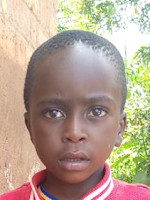

Birthday
December 15, 2019
Age
Age: 6
Gender
Boy


Daniel is 6 years old and lives in Tanzania.
I live with my mother in the Mbeya area. The primary language where I live is Swahili. My mother is sometimes employed as a farmer. At home, the chore I'm responsible for is running errands. I like ball games. My favourite activities at church are Sunday school and Bible class. I am in the equivalent of preschool.
As East Africa's largest country, Tanzania displays great diversity, including a low-lying coastal belt, a highland plateau populated by rich wildlife reserves, and the island of Zanzibar, a former spice centre. It is home to Kilimanjaro, Africa's highest mountain, as well as the famed Serengeti National Park. Animal life is abundant thanks to the historically low levels of human settlement.
Tanzania is a mostly agricultural country with wide plains and vast plateaus peppered with the huge craters and volcanoes of the Great Rift Valley. Major industries include cotton, coffee, diamond and gold mining, textiles, cement and tourism. Swahili and English are the official languages of Tanzania's more than 120 ethnic groups, about half of which are Christian and a third Islamic.
As of a thousand years ago, Tanzania was inhabited by a mix of Bantu, Arab and Indian peoples. The Portuguese arrived in the 15th century but were driven out by the Arabs of Zanzibar in the 1700s. German colonists first arrived in the late 19th century and established a colony that was later captured by the British during World War I. Known as Tanganyika, after WWII, the territory came under the trust of the UN and finally achieved independence in 1961. In 1964 it unified with Zanzibar and changed its name to Tanzania.

Compassion’s ministry is focused on what we call holistic child development. This means developing children in all the different aspects of their lives—their minds, bodies and relationships—while giving them the opportunity to hear about and experience the love of Jesus from caring local church staff and volunteers.
Absolutely not! We encourage children and families of all faiths and backgrounds to register in our programs and would never require or coerce anyone to convert to Christianity.
Learn MoreToday, children around the world are discovering that poverty doesn’t have to be their future. Help one more do the same by sponsoring with Compassion!

While we're sorry you could not sponsor this specific child, we would love to help you find a different child to sponsor.
Age: